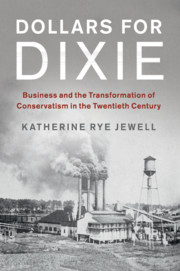'Jewell’s eye-opening, meticulously-researched account of the transformation of the modern South makes Dollars for Dixie a must-read for anyone trying to understand the businessmen who remade that region and, in the process, helped upend the rest of the country’s business dealings and politics.'
Elizabeth Shermer - Loyola University Chicago
'In this deeply researched and engagingly written study of the Southern States Industrial Council, Katherine Rye Jewell convincingly illustrates the central role played by southern manufacturers in the rise of free enterprise ideas within the broader conservative movement. This book is essential reading for anyone seeking to understand the economic and political development of the South and the nation in the twentieth century.'
Kari Frederickson - University of Alabama
'Jewell makes a vital contribution to our understanding of regional disputes over industrial policy in the 1930s and their effect on the southern leadership that remade the political economy of the nation, post-World War II. This is an incredibly important work for anyone interested in the history of American capitalism and the rise of conservative politics in the second half of the twentieth century.'
Joe Crespino - Emory University, Atlanta
'Jewell's impressively researched Dollars for Dixie provides the first major study of the often-overlooked Southern States Industrial Council, and its role in forging a political voice for southern business leaders during and after the New Deal. In so doing, she gives new insights into the relationship between the particular interests of southern business and the rise of a national conservative movement.'
Kim Phillips-Fein - New York University
'This volume traces the activities of the Southern States Industrial Council (SSIC), an organization strongly supported by textile mill owners. … With the perception that the New Deal was anti-southern as a result of the influence exercised over it by northern liberals, SSIC leaders were among the first to break with the region’s traditional party and favor two-party competition. This volume documents the shifting SSIC policy emphasis from the 1930s through the 1960s. … Recommended. Graduate students through faculty.'
C. S. Bullock, III
Source: Choice



